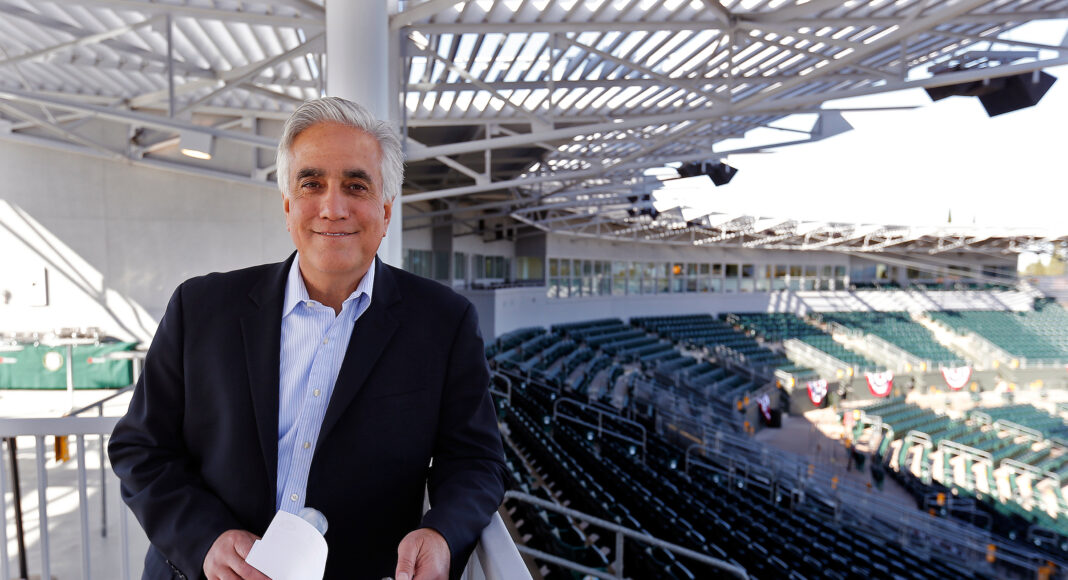For more than 20 years, my friend Pedro Gomez and I had been saying that even in our 70s we’d be laughing over stories of our time together as Oakland A’s beat writers in the ‘90s. Now, I can’t stop thinking about how when I’m in my 70s, I’ll still be hearing Pedro’s voice in my ear, scolding me, laughing at me, or reminding me of something important, decades after his death this February.
To his close friends, who were many, Pedro was “the exclamation point on every sentence,” as ESPN reporter T.J. Quinn put it, a companion whose electric enthusiasm for life powered all of us and deepened the colors of our existence. To Major League Baseball, he was one of the great reporters of his generation: a beloved and respected writer who started out covering ball for the San Jose Mercury News and became a fixture on TV and a crucial bridge to Latin American ballplayers and fans.
Since Pedro’s death on Super Bowl Sunday, I’ve been thinking about how often we look to others to make us better, to inspire us or to pull us along by example. When death takes them, we’re in shock at the realization of how vital that friendship was, and how in need we all are deep down.
I thought with time I might stop hearing his voice in my ear so much, but the opposite was true, even after three months of intense work assigning, gathering and editing the 62 personal essays in Remember Who You Are: What Pedro Gomez Showed Us About Baseball and Life. Suddenly, I’d hear him. “A lot of Miami in this game,” he’d say, his voice full of commiseration and realism. I had to smile, his presence was so palpable.
Bay Area baseball fans may recall the jolt of lucidity following the Home Run Hitting Contest at the 2013 All-Star Game. The winner, Yoenis Céspedes, was a Cuban then with the A’s. Just two summers removed from his dramatic speed-boat escape from Cuba, Céspedes spoke little English. For an instant, a vague feeling of dread loomed as he stood next to the ESPN reporter, ready to go live before an audience of over 6.8 million. Surely, this would be another dull interview, the demands of entertainment robbing another man of his dignity.
Instead, Pedro turned that encounter into crackling theater. He asked Céspedes a question in English, then with the rhythm of a dancer slipped in a quick, fluid burst of Spanish to give Céspedes the gist, listened to the left-fielder reply in Spanish, and—again, with a speed and smoothness he made look easy—smiled, gave the answer in English, and continued the interview.
For anyone who remembers how the great and dignified Robert Clemente was treated like a dunce and a rube for not speaking English, this was a titanic step forward: actual social progress seen unfolding in real time.
“I always felt that Pedro was less interested in the game than he was in the people,” former A’s GM Sandy Alderson writes in his essay. “That focus on the human element is something that baseball has lost in the last few years. We need to bring back that aspect of the game.”
Pedro was a man who listened well, with all his attention and heart. More than anything, I hope that Remember Who You Are can inspire people to follow that example.
In his essay, former Texas Rangers manager Ron Washinton (now with the Braves) says: “to become a great coach you have to listen. You’ll never get anywhere if you go in with an attitude of ‘I know everything.’ It’s tough to coach up somebody when you haven’t let them show you who they are.”
Pedro always let people show him who they were.
In recent weeks, I’ve thought again and again about a call we had two years ago. I’d been given an opportunity to go to Gaza for a book project. It wasn’t clear I could even get through the Israeli checkpoint, and I’d be leaving my wife and young daughters on short notice.
Pedro heard all of that. Still, he knew what I was going to decide.
“It’s who we are,” he said.
‘Remember Who You Are: What Pedro Gomez Showed Us About Baseball and Life’ is available at Books Inc. in Campbell, Kepler’s in Menlo Park and bookstores everywhere.



